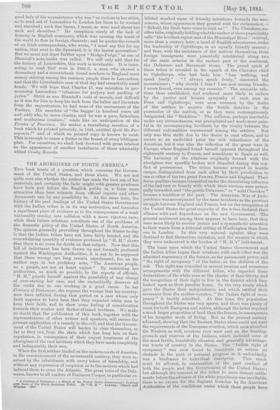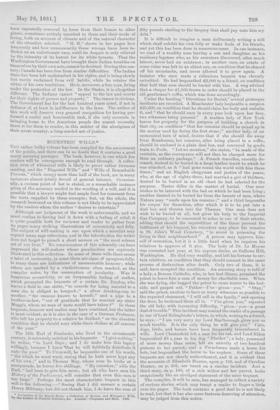THE ABORIGINES OF NORTH AMERICA.*
THIS book treats. of a question which concerns the Govern- ment of the United States, and them alone. Wo are not quite sure also whether the author has made the best use of her materials, and certainly the facts might with greater prudence have been put before the English public in a form more attractive than bare extracts from official reports and other documents can by any possibility be. At the same time, the history of the past dealings of the United States Government with the Indian tribe° is in its way instructive, and furnishes a significant piece of evidence as to the consequences of a weak nationality coming into collision with a more vigorous race ; while their future relations constitute one of the problems of the domestic policy of the United States of North America. The opinion generally prevailing throughout the States to-day is that the Indian tribes have not been fairly treated, and the overwhelming quantity of evidence produced by "H. H." shows that there is no room for doubt on that subject. Now that this bill of indictment has been drawn up and formally preferred against the Washington Authorities, it is not to be supposed that these wrongs can long remain unrodressed, for, as the author says in her prefatory note, "The American people, as a people, are not at heart unjust." By restricting her authorities, as much as possible, to the reports of officials, "H. H." guards herself against the possibility of any charge of over-stating her case, and she undoubtedly deserves all the credit due to one working in a good cause. In her Century of Dishonour, she exposes the wrongs that her country- men have inflicted during that period on a race whose only fault appears to have been that they expected white men to keep their faith, and to show some feeling of consideration towards their weaker and darker-skinned brethren. We make no doubt that the publication of this book, together with the representations of other writers and speakers, will ensure the prompt application of a remedy to the evil, and that the Govern- ment of the United States will hasten to clear themselves, so far as they can, from the stain which has long lain on their reputation, in consequence of their unjust treatment of the aborigines of the vast territory which they have made completely and indisputably their own.
When the first settlers landed on the eastern coasts of America, in the commencement of the seventeenth century, they were re- ceived by the inhabitants with every token of friendship, and without any expression of suspicion as to the motives which had induced them to cross the Atlantic. The groat tribe of the Dela- wares, known to all readers of Fenimore Cooper, in particular ex- * A Century of Dishonour ; a Sketch of the United States Government's Dealings with Some of the North-American Tribes. By "H. H." London; Ohatto and Windup. 1841.
hibited marked signs of friendly intentions towards the new- comers, whose appearance they greeted with the exclamation,— " Behold, the Gods have come to visit us ! " The Cherokees, an- other tribe, originally holding what the author of these pages justly calls "the loveliest region east of the Mississippi River," received, more than a century later, a baud of English adventurers, under the leadership of Oglethorpe, in an equally friendly manner ; and thus, with the assistance of the natives themselves, these foreign immigrants were peacefully established along two of the main arteries in the eastern part of the continent, the Delaware and Savannah rivers. The proud spirit of these tribes is revealed in the speech of the Cherokee chief to Oglethorpe, who had bade him fear nothing, and speak freely." " I always speak freely," answered the mountaineer; " why should I fear P I am now among friends ; I never feared, even among my enemies." The amicable rela- tions thus established, and rendered more likely to endure by the justice and human sympathy of such men as Penn and Oglethorpe, were soon overcast by the desire of the settlers to acquire the fertile districts in the possession of the natives, or as they were contemptuously designated, the " Redskins." The collision, perhaps inevitable under any circumstances, was precipitated and made more pain- ful in its accompanying incidents by the rivalry between the different nationalities represented among tho settlers. Not only was this strife due to the desire to oust others, and to secure as an undivided prize the rich inheritance of the Americas, but it was also the reflection of the great wars in Europe, where England found herself opposed throughout the eighteenth century to France, and sometimes to Spain as well. The harmony of the relations originally formed with the aborigines was speedily broken and dispelled during this con- flict of pretensions. The tribes became arrayed in hostile camps, distinguished from each other by their proclivities to • one or other of the two great Powers, France and England. Their fierce qualities became intensified under the stimulating influence of the bad rum or brandy with which their services were princi- pally rewarded, and " the gentle Delaware," or " mild Cherokee " became a tradition of the past. The American War of Inde- pendence was accompanied by the same incidents as the previous struggle between England and France, but on the recognition of the United States the great majority of the tribes declared their alliance with and dependence on the new Government. The general sentiment among them appears to have been, that they were more likely to receive justice and a sympathetic attention to their wants from a tribunal sitting at Washington than from one in London. In this very natural opinion they were destined to find themselves mistaken, and the manner in which they were undeceived is the burden of " H. H.'s" indictment.
The basis upon which the United States Government and the Indian tribes began their relations with each other was the admitted supremacy of the former, as the paramount power, and " the right of occupancy " of the latter, as the children of the soil. This right was conceded in several treaties and numerous arrangements with the different tribes, who regarded these declarations of the white man as the charter of their liberty, and the recognition of their right to live in the district which they looked upon as their peculiar home. In the very treaty which gave the States their independence, and which ratified their severance from the mother-country, " the Indian right of occu- pancy" is tacitly admitted. At this time, the population throughout the States was very sparse, and there was plenty of room for both European and native, although the latter required a much larger proportion of land than the former, in consequence of his irregular mode of living. But as the present century advanced, showing that the Eastern States alone could not meet the requirements of the European overflow, which soon absorbed the Western as well, covetous eyes were cast on the hunting. grounds and reserves of the Indians, which included some of the most fertile, beautifully situated, and generally advantage- ous tracts of country in the States. The "Indian right of occupancy" was soon found to constitute as serious an obstacle in the path of national progress as it undoubtedly was a hindrance to individual enterprise. This much must be allowed, in extenuation of the past conduct of both the people and the Government of the United States ; but although the removal of the tribes to more distant settle- ments before the advance of the white population was inevitable, there is no excuse for the flagrant broaches by the American Authorities of the conditions under which those people have !been repeatedly removed by force from their homes to other places, sometimes entirely unsuited to them and their mode of living, both on account of climate and of the natural character of the situation selected. " H. II." shows iu her pages how frequently and how unnecessarily these wrongs have been in- flicted on an unfortunate race, until its despair is only relieved by the intensity of its hatred for its white tyrants. That the Washington Government have brought their Indian troubles on themselves by their own acts, cannot be doubted. During this cen- tury, Canada has been free from similar difficulties. The Indian there has been left undisturbed in his rights, and is being slowly but surely reclaimed from evil habits, while he retains the virtue of his own traditions. He is, moreover, a free man, living under the protection of the law. In the States, it is altogether different. The Indians cannot " appeal to the law and courts for their rights of person and property." The reason is obvious. The Goverument has for the last hundred years acted, if not in defiance of, at least in indifference to the laws. The author of this work will deserve very general recognition for having per- formed a useful and honourable task, if she only succeeds in bringing home to the American people the urgent necessity there is for them to render, in this matter of the aborigines of their great country, a long-needed act of justice.



































 Previous page
Previous page